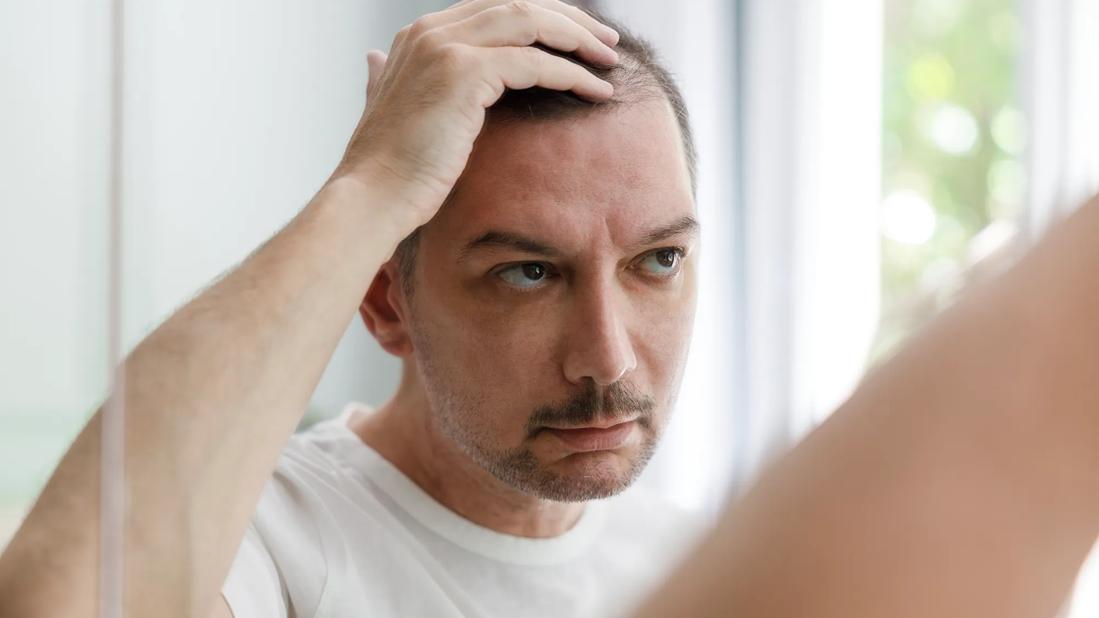Your body’s response to rapid weight loss from the medication may cause shedding

Image content: This image is available to view online.
View image online (https://assets.clevelandclinic.org/transform/5c1e1875-838d-4d54-ad8e-a187aded67d7/hair-loss-2157845003)
Person checking out their hairline and hair in a mirror
Weight loss is the typical goal if you take Ozempic® or some other type of GLP-1 agonist. But in some cases, people taking the medication shed more than just pounds. They also lose clumps of hair.
Advertisement
Cleveland Clinic is a non-profit academic medical center. Advertising on our site helps support our mission. We do not endorse non-Cleveland Clinic products or services. Policy
So, how do Ozempic, Mounjaro®, Wegovy® and similar GLP-1s cause hair loss? We asked endocrinologist Kathy Zhou, MD, to explain why it happens and how you may be able to limit the loss.
Let’s start with the basics: It’s NOT the medication itself that might cause your hair to start falling out. Instead, it can be a reaction as your body rapidly loses weight from the treatment. Basically, your system goes into preservation mode.
The same thing can happen after bariatric surgery as your body drops pounds.
“Your body can perceive weight loss as a stress,” explains Dr. Zhou. “As this happens, it begins to hold on to resources for your vital organs. It wants to protect your heart before it worries about giving you a nice head of hair.”
So, your hair may come out in large clumps that you find on your pillow in the morning. It can result in your hair looking noticeably thinner, with areas of your scalp exposed or more pronounced receding.
The official name for stress-induced hair loss is telogen effluvium, but many refer to it as “Ozempic hair” after the popular GLP-1 medication.
A few factors contribute to hair falling out after rapid weight loss.
Your hair-growth cycle is made up of three phases: Growth, resting and shedding.
Advertisement
“Most of your hair — about 80% to 90% — is usually in a grow-grow-grow phase,” explains Dr. Zhou. “But when your body experiences a stressor, more hair gets pushed into that ‘quiet’ resting phase. From there, it’s just a few weeks to months until you start to see hair loss.”
Ozempic and other GLP-1s decrease your appetite and make you feel fuller after eating smaller portions. As you’re eating less, what you munch on is very important.
“We see some people become malnourished if they’re not being intentional with their eating,” shares Dr. Zhou. “That can lead to deficiencies in protein, iron, zinc and other nutrients and contribute to excessive hair loss.”
Medications like Ozempic can indirectly affect your thyroid and hormone stability to contribute to hair loss, though it’s to a lesser degree than other potential stressors, says Dr. Zhou.
Dr. Zhou estimates that 25% to 33% of people taking Ozempic and similar medications used for weight loss experience some degree of hair loss. “It’s a somewhat significant number,” she says.
What can you do to help keep your hair in place? Dr. Zhou offers these suggestions.
But even if you take precautions, some hair loss is still possible when taking Ozempic or other GLP-1s. “It may not be avoidable for some people,” she adds.
It may take a few months, but any hair you lose after beginning a weight-loss medication typically grows back. It’s just a matter of your body’s natural hair growth cycle restarting to replace what was lost.
“After your body experiences this stress and sheds hair, it needs to restabilize to go back into a growth cycle,” says Dr. Zhou.
If your hair loss is significant or growth isn’t restarting as expected, your doctor may recommend screenings to look for any other underlying causes, like an iron deficiency or a hormone imbalance.
Hair loss isn’t listed as an official side effect of Ozempic and GLP-1s by the U.S. Food and Drug Administration (FDA). But it’s a reality for many who use the medications.
“The potential for temporary hair loss is something I mention to my patients so they’re prepared for it,” says Dr. Zhou. “But it’s a tradeoff many people are willing to make when you look at the overall benefits that come with taking GLP-1s for weight loss.”
Advertisement

Sign up for our Health Essentials emails for expert guidance on nutrition, fitness, sleep, skin care and more.
Learn more about our editorial process.
Advertisement
The little blue pill might help with physical arousal, but there are better treatments for low libido in women
This medication is best used on a limited basis
Authorized take-back programs, services and drop-off locations are the best, safest way to get rid of expired medicine
These illegal supplements have negative impacts for vital organs and may cause psychosis, heart attacks and more
These creams that you apply to your skin can actually help reduce localized pain, swelling and inflammation
Popular among teens, these inhalants give you a quick high, with serious harmful effects
‘Black box warnings’ on medications outline potential risks and important instructions
These similar versions of brand-name drugs are safe, effective and often less expensive
Although it could be used as a moisturizer, this new trend is not recommended
Communicating clear limits helps protect your time, energy and emotional well-being
High cholesterol can be genetic, but testing and treatment can lower your heart disease risk